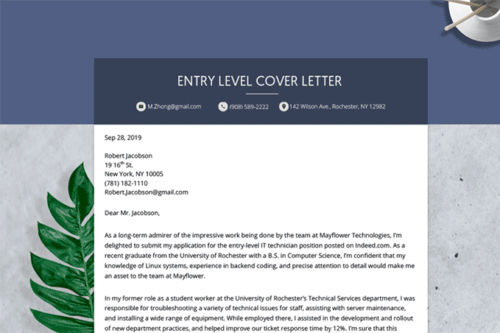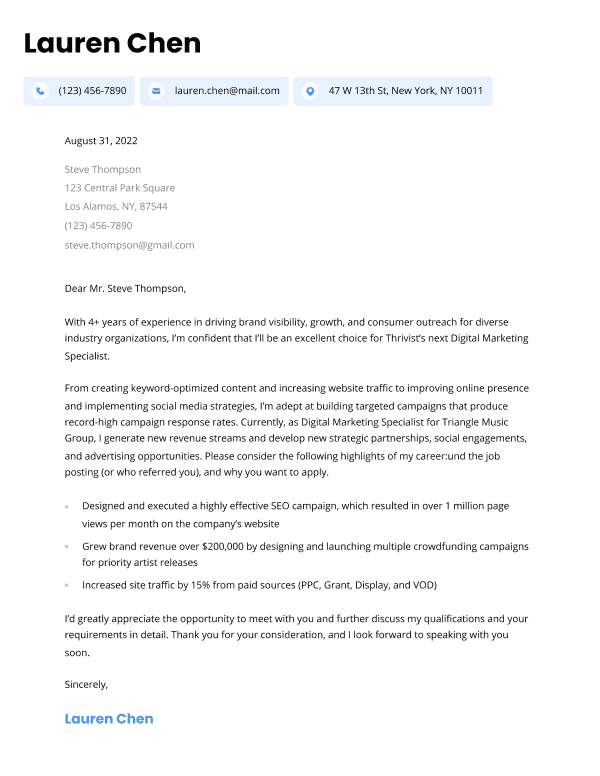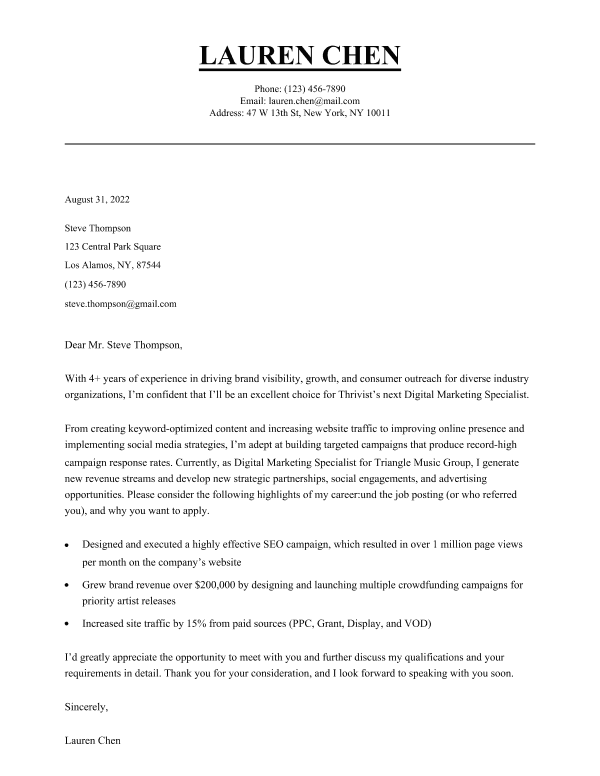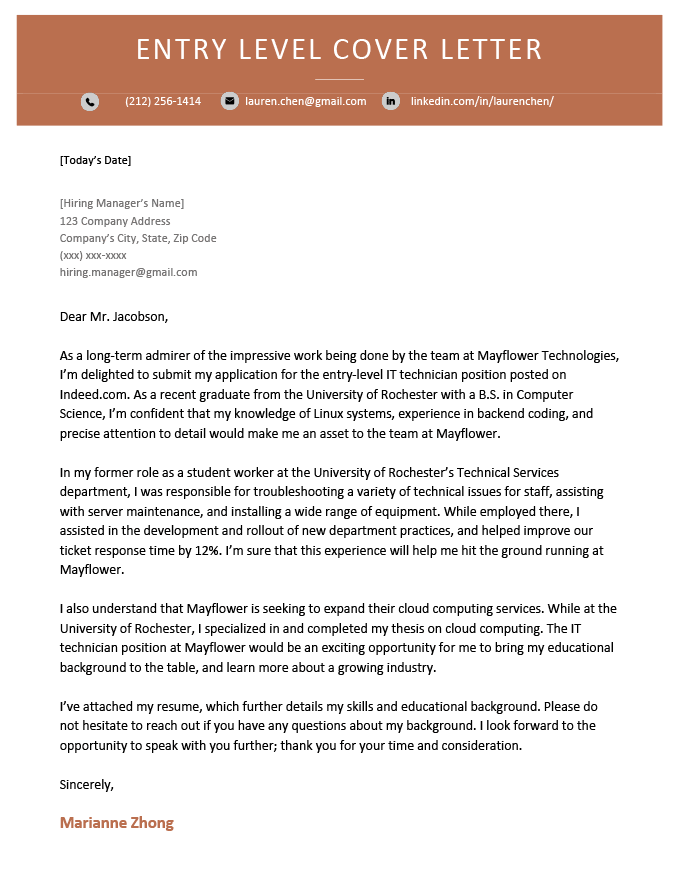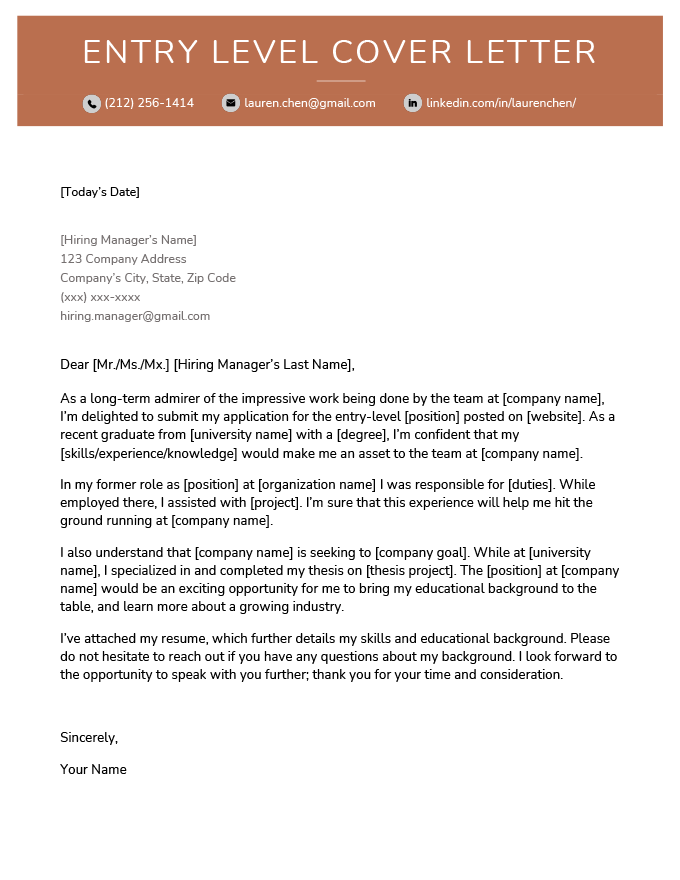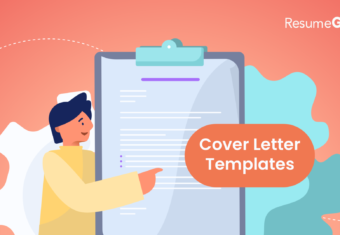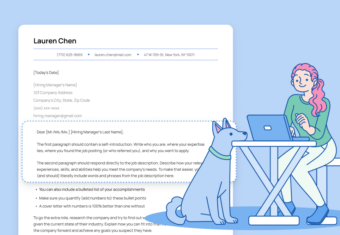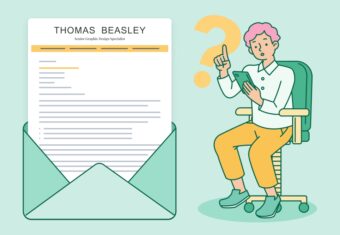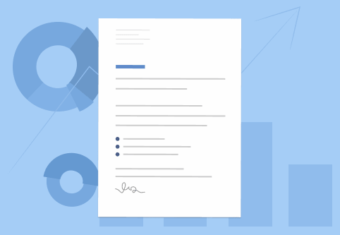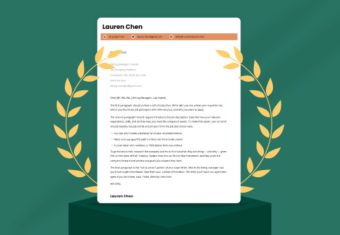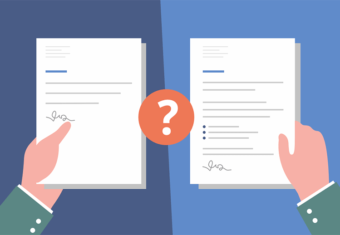An entry-level cover letter shows a hiring manager you’re passionate about the position, supplements your resume education section, and proves you have what it takes to succeed.
To learn how to write a cover letter for a job you have no experience in that highlights the qualifications you do have, keep reading.
Our free-to-use cover letter builder can make you a cover letter in as little as 5 minutes. Just pick the template you want, and our software will format everything for you.
Entry-level cover letter example
Here’s a professionally written entry level IT-cover letter example:
Entry-level cover letter sample (text version)
Sep 28, 2019
Robert Jacobson
19 16th St.
New York, NY 10005
(781) 182-1110
Robert.Jacobson@gmail.com
Dear Mr. Jacobson,
As a long-term admirer of the impressive work being done by the team at Mayflower Technologies, I’m delighted to submit my application for the entry-level IT technician position posted on Indeed.com. As a recent graduate from the University of Rochester with a B.S. in Computer Science, I’m confident that my knowledge of Linux systems, experience in backend coding, and precise attention to detail would make me an asset to the team at Mayflower.
In my former role as a student worker at the University of Rochester’s Technical Services department, I was responsible for troubleshooting a variety of technical issues for staff, assisting with server maintenance, and installing a wide range of equipment. While employed there, I assisted in the development and rollout of new department practices, and helped improve our ticket response time by 12%. I’m sure that this experience will help me hit the ground running at Mayflower.
I also understand that Mayflower is seeking to expand their cloud computing services. While at the University of Rochester, I specialized in and completed my thesis on cloud computing. The IT technician position at Mayflower would be an exciting opportunity for me to bring my educational background to the table, and learn more about a growing industry.
I’ve attached my resume, which further details my skills and educational background. Please do not hesitate to reach out if you have any questions about my background. I look forward to the opportunity to speak with you further; thank you for your time and consideration.
Sincerely,
Marianne Zhong
What makes this entry-level cover letter sample stand out is how the candidate convincingly markets their strengths.
From the start, they emphasize their enthusiasm about the job opportunity, and call attention to the relevant job skills they bring to the table. While they don’t have any full-time work experience, the candidate still highlights the experience they do have, and connects their relevant coursework to the company’s goals.
This demonstrates to the hiring manager that they not only have the basic skills needed to excel, but have also researched the position, and are passionate about the work being done by the company.
Entry-level cover letter template
To help you get started with your entry level cover letter, we’ve provided a template for you to adjust to fit your own specific requirements:
Entry-level cover letter template (text version)
City, State, Zip Code
(xxx) xxx-xxxx
hiring.manager@gmail.com
Dear [Hiring Manager’s Name],
As a long-term admirer of the impressive work being done by the team at [company name], I’m delighted to submit my application for the entry-level [position] posted on [website]. As a recent graduate from [university name] with a [degree], I’m confident that my [skills/experience/knowledge] would make me an asset to the team at [company name].
In my former role as [position] at [organization name] I was responsible for [duties]. While employed there, I assisted with [project]. I’m sure that this experience will help me hit the ground running at [company name].
I also understand that [company name] is seeking to [company goal]. While at [university name], I specialized in and completed my thesis on [thesis project]. The [position] at [company name] would be an exciting opportunity for me to bring my educational background to the table, and learn more about a growing industry.
I’ve attached my resume, which further details my skills and educational background. Please do not hesitate to reach out if you have any questions about my background. I look forward to the opportunity to speak with you further; thank you for your time and consideration.
Sincerely,
Your Name
How to write an entry-level cover letter with no experience
A general cover letter is used to demonstrate the relevant skills you learned at previous jobs, and how your work experience makes you qualified.
But if you’re writing a cover letter with no experience in your field, filling up space with irrelevant accomplishments won’t do you any favors.
Here’s what you need to do in your entry-level cover letter (also known as a letter of application) to impress the hiring manager and stand out:
1. Address your cover letter correctly
Knowing how to address your cover letter correctly is important because it sets the tone for the rest of your cover letter. If your entry-level cover letter isn’t addressed to the right person, or even the right company, your application might get rejected before you get the chance to show why you’re an excellent candidate for the position.
Typically, you would address the hiring manager directly by using their title and last name. Sometimes, however, you might not know the hiring manager’s name. In this case, do some research on LinkedIn and the company website to try to find out who they are.
If you’re still unable to find a name, you have a few different options. You can address your cover letter with:
- Dear Sir/Madam
- Dear Hiring Manager
- Dear Human Resources Director
Avoid “To Whom It May Concern”, as some hiring managers consider it too old fashioned and won’t read cover letters that begin with this phrase.
2. Open with a strong introduction
Your introduction is the first part of your cover letter that a hiring manager reads, so it’s critical that you know how to start a cover letter in a way that grabs their attention.
A great entry-level cover letter introduction should include:
- An expression of your enthusiasm about the work the company does
- The position you’re applying for
- A short blurb regarding your background
- A brief introduction to your accomplishments or talents
Here’s a breakdown of the introduction our applicant used to kick-start their cover letter:
Strong Introduction
As a long-term admirer of the impressive work being done by the team at Mayflower Technologies, I’m delighted to submit my application for the entry-level technician position posted on Indeed.com. As a recent graduate from the University of Rochester with a B.S. in Computer Science, I’m confident that my knowledge of Linux systems, experience in backend coding, and precise attention to detail would make me an asset to the team at Mayflower.
The introduction of your cover letter is also where you should mention any contacts you have at the company. This helps add context, and immediately builds rapport with the hiring manager (assuming those contacts are in good standing where they work).
3. Include important skills for an entry-level employee
Whether you have great interpersonal skills, a keen attention to detail, or the ability to code, every company has its own set of requirements and preferences for their ideal candidate.
If you don’t have work experience, highlighting your skills is a great way to stand out and make yourself look more appealing to employers.
If you’re a recent graduate, you’ve likely picked up some highly sought after transferable skills from school or extracurricular activities. Some examples of transferable skills include:
- Analysis
- Communication
- Time management
- Verbal communication
- Written communication
- Research
- Presentation
- Active listening
- Facilitation
- Prioritization
Scan the job posting to find some essential skills for your target industry. Then, include them in your cover letter to demonstrate that you have the baseline knowledge necessary to excel.
Additionally, if there are certain skills you don’t have but seem important to the position, use your cover letter to emphasize your enthusiasm for learning them.
Many hard skills can be learned while on the job. So if you’re just starting out, emphasizing your soft skills instead is a great way to show employers you’re a worthwhile investment.
4. Show interest in the company
One of the best ways to make your entry-level cover letter pop is to tailor it to the job you’re applying for by thoroughly researching the company.
First, read up on the company’s history, its products, goals, and any challenges it’s facing. This will give you a better understanding of what qualities the hiring manager is looking for in its newest employees.
Then use your cover letter to address specifics about the position, like why you think you’re suited for it, and how it plays a role in your long-term goals.
In the entry level cover letter example above, the candidate does this by stating:

By showing an interest in the company’s goals, this candidate comes across as both excited, knowledgeable, and well prepared to get involved in one of the company’s upcoming projects.
As an added bonus, your newfound knowledge about the company will help you when it comes time to interview. You’ll be able to think of meaningful questions to ask the interviewer, as well as answer theirs.
5. End with a call to action
Knowing how to end your entry level cover letter is just as important as knowing how to start it. To ensure that your application makes an impression on the hiring manager, your final paragraph should end with a call to action to demonstrate that you’re serious about the job and would like to be considered for the next step of the hiring process.
Here’s an example of a call to action on a cover letter for an entry level job:

The candidate clearly conveys their interest and shows initiative by indicating that they are willing to further discuss why their specific set of skills and qualifications make them well suited for the role at an interview.
Entry-level cover letter examples by industry
Here’s a list of specific entry-level cover letter examples by industry if you’re looking for more helpful resources and examples:
Click to rate this article
4.4 Average rating


